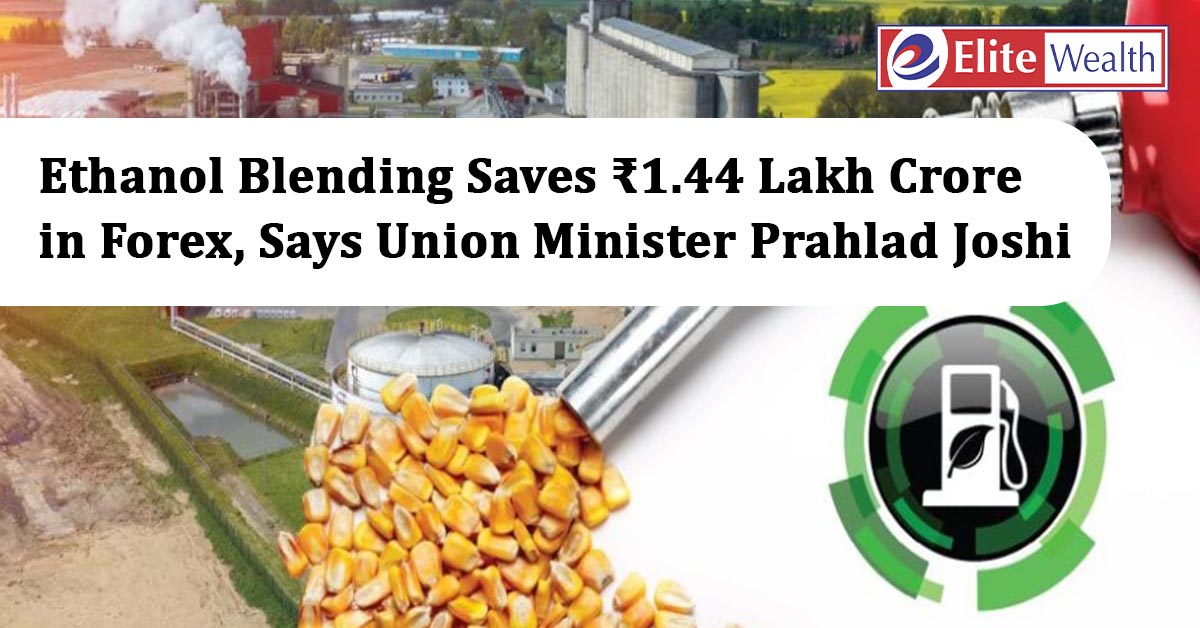
India’s ethanol blending programme has delivered a foreign exchange saving of ₹1.44 lakh crore by reducing the country’s crude oil import bill, Union Minister of Consumer Affairs, Food and Public Distribution Prahlad Joshi said on Thursday. The minister was addressing The India Sugar & Bio-Energy Conference, where he highlighted India’s achievements in ethanol production, renewable energy, and future policy directions.
Ethanol Blending: A Game Changer for India’s Energy Security
Joshi noted that sugarcane production has risen by 40% in the past 11 years, boosting India’s capacity to produce biofuels. He underlined the rapid progress in ethanol blending with petrol:
- 2014: Ethanol blending stood at just 1.5%
- 2025: Blending ratio has reached 20%
“This has not only strengthened India’s energy sector but also saved the country ₹1.44 lakh crore in foreign exchange,” Joshi said.
The minister encouraged biofuel producers to further scale up ethanol production and boost exports, stressing that the sector is central to India’s vision of sustainable growth and energy independence.
Push for Solar and Renewable Energy Expansion
In addition to ethanol, Joshi, who also holds the portfolio of Minister for New & Renewable Energy, spoke at the review meeting of the PM Surya Ghar Muft Bijli Yojana and PM-KUSUM schemes.
He shared updates on progress:
- 20 lakh rooftop solar installations completed
- Another 30 lakh installations expected shortly
- Target: One crore households under the PM Surya Ghar scheme
Joshi also approved a utility-led model to enable solar benefits for households without rooftops, following requests from states like Andhra Pradesh. “Some states are progressing at a very fast pace. We want others to follow suit and take proactive measures,” he said.
He emphasized that the scheme is demand-driven and benefits will be available on a first-come, first-serve basis. Already, nearly 50% of beneficiaries are receiving zero electricity bills, demonstrating its direct impact on citizens.
Renewable Energy Targets and Domestic Solar Value Chain
Looking ahead, Joshi reaffirmed India’s 550 GW renewable energy capacity target by 2030. Currently, the country has installed 251.5 GW of non-fossil fuel-based capacity, leaving an additional 248 GW to be added in the next five years.
He highlighted progress in domestic solar manufacturing:
- India now has 100 GW module manufacturing capacity
- Investment of ₹50,000 crore in the sector
- Over 12,600 direct jobs created
India is also moving towards complete self-reliance by setting targets for Swadeshi solar cells by 2028, and expanding into indigenous wafers and ingots, creating a full solar value chain within the country.
Upcoming Policy Moves
- PM-KUSUM 2.0: Work is underway on the second phase of the scheme, expected after the current phase ends in March 2026.
- GST Cuts: Recent reduction of GST on renewable energy devices from 12% to 5% is expected to make solar panels, windmills, biogas plants, and waste-to-energy systems more affordable.
Joshi urged states to actively push these schemes and adopt renewable-friendly policies, pointing out challenges around compliance, grid connectivity, and licensing that need urgent attention.
Expert Takeaway
India’s rapid progress in ethanol blending, renewable energy adoption, and solar manufacturing reflects a twin focus: reducing dependence on fossil fuel imports while strengthening domestic industries. With large-scale adoption of schemes like PM Surya Ghar and PM-KUSUM, India is not only saving foreign exchange but also empowering households with cheaper, cleaner energy.
The challenge, however, lies in execution—achieving another 248 GW of renewable capacity within five years will require coordinated efforts between the Centre, states, and industry players.
Disclaimer:
This article is intended solely for educational and informational purposes. The securities or companies mentioned are provided as examples and should not be considered as recommendations. Nothing contained herein constitutes personal financial advice or investment recommendations. Readers are advised to conduct their own research and consult a qualified financial advisor before making any investment decisions.
Investments in securities markets are subject to market risks. Please read all related documents carefully before investing.


